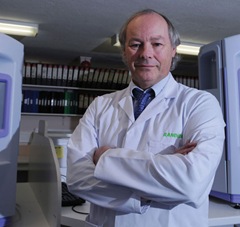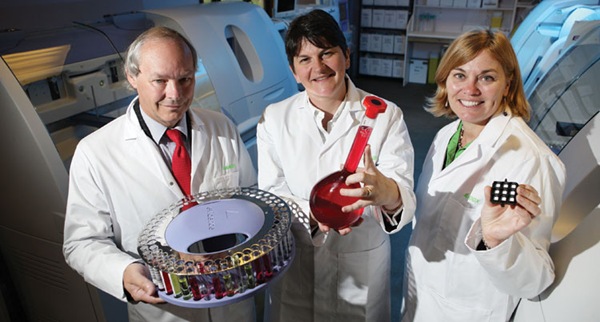Essential innovation
Randox Laboratories founder Dr Peter FitzGerald talks to Gary McDonald about innovation’s importance and its application in the business he started from scratch.
“An established company which, in an age demanding innovation, is unable to innovate, is doomed to decline and extinction.”
Dr Peter FitzGerald can’t, nor won’t, lay claim to that quote (in fact, it’s attributable to a namesake, the acclaimed business thinker Peter Drucker) but it’s a mantra the founder and managing director of Randox Laboratories obdurately adheres to as his company continues to pioneer the development of revolutionary diagnostic tests. Its revolutionary products include checks for heart problems, a range of cancers including ovarian, breast and colorectal, thyroid problems, diabetes, liver disease and renal disease, and they are sold hospitals, research laboratories and pharmaceutical companies the world over.
Randox, with its modest headquarters tucked away almost anonymously along the back roads around Crumlin, considers innovation – and the successful exploitation of new ideas – as an overwhelming imperative.
“We never stand still here. Our mission is to transform healthcare by continuously improving diagnostic solutions which, for us, ultimately means saving lives,” says Dr FitzGerald, who has nursed a passion for medical research since childhood.
Having studied biochemistry at the University of Strathclyde in Glasgow and then taking a PhD at the National Institute for Medical Research in London, it was while working as a researcher at Queen’s University in Belfast that his yearning to help cure or solve illnesses drove him to set up his own company.
Based then (1982) in a converted henhouse at the back of his parents’ house, the business rapidly outgrew that early laboratory, so he relocated five miles away to an old apple farm that had cold storage rooms, the genesis of the modern-day Randox Laboratories.
Edge
One constant during the company’s 28- year history in the global clinic diagnostics industry has been innovation. Dr FitzGerald accepts that businesses which fail to adapt by applying innovative thinking to all aspects of their organisation will be left in others’ slipstreams.
“Our competitiveness and prosperity has always depended on our ability to move further up the value chain. Innovation has been absolutely essential to safeguard and deliver high-quality jobs, a successful business and, most importantly for us, better products with the potential to save lives. Our future economic success will spring from continued investment in innovation, which is at the very core of what gives companies like our a competitive edge in the global marketplace.”
The Randox boss, who is married with a grown-up family of two, insists that today is among the most exciting periods ever for medicine.
“Decisions are still being taken which are not based on solid scientific or objective evidence, so the more we can do to help give clinicians facts and objective information, the more we can help identify what the disease malfunction or the condition is.
“We have now developed the first commercially marketed protein biochip and assay system, which can be employed to process thousands of biological materials in seconds. No bigger than a postage stamp, this unique technology enables clinicians to present a more accurate –and earlier – diagnosis.”
Randox claims its tests can ultimately lead to life expectancy improving by 20 per cent – as well as saving vital financial resources for the Health Service.
Today Randox ranks in the world’s top 20 largest diagnostics company, manufacturing 2.5 billion of the 100 billion tests carried out worldwide, and produces seven per cent in volume of all clinical chemistry tests carried out in the world – or about 3 per cent of the value of the market. 
The company has also grown to one employing 800 people (about 600 of them in Northern Ireland), generating revenues of close to £60 million a year and selling to 30,000 customers in130 countries (just 6 per cent of its business is in the UK and Ireland).
Since its inception Randox has amassed a surfeit of international recognition, including five Queen’s Awards (a record for a Northern Ireland company), and last year alone it claimed the Product Innovation Award at the UK Manufacturing Excellence Awards and was Innovator of the Year at Invest NI’s Innovation and Export Awards.
Research
Central to this is the company’s ongoing investment in research and development, which currently runs to more that £10 million a year, putting it in the 10 biggest R&D spenders in Northern Ireland.
“By investing in R&D we are investing in our future and equipping ourselves to innovate,” says Dr FitzGerald.
While he won’t say it, it must have been with some personal disquiet for him to learn that total R&D spend in Northern Ireland last year, at £344 million, was the first drop in real terms in five years. More than half of the expenditure (£184 million) was by the businesses, £144 million by education and just £16 million by government.
Indeed R&D expenditure by indigenous companies slumped by more than nine per cent (£7.3 million) in cash terms between 2008 and 2009 while that by externally-owned firms increased by nearly 6 per cent (£6.1 million).
In addition to the more traditional clinical diagnostic products Randox has further extended its product range to include human recombinant proteins, polyclonal and monoclonal antibodies as well as drug conjugates specific to a comprehensive list of target groups including bio-chemical markers, growth promoters, drugs of abuse, anti-parasitic drugs, anti-inflammatory drugs and antimicrobial drugs.
Expansion
Randox’s extensive range consists of more than 1,000 products all manufactured at its ISO 13485 accredited Crumlin manufacturing plant.
“Our product range is set to expand even further with more than 200 new products currently in development,” said Dr FitzGerald. “As a recognised primary manufacturer of life science products with more than 185 research scientists we can guarantee customers receive high quality, reliable and efficient products and services.”
Due to ongoing expansion plans within Randox – in February the company unveiled a £30 million funding package secured through Northern Bank to assist with its future growth – the company is frequently seeking individuals with the drive and commitment to join one of the many teams within its global organisation.
And it will be commencing another major recruitment drive in the spring, when it will be seeking out enthusiastic individuals across a number of disciplines, ranging from high-end R&D, laboratory science and instrument engineering through to marketing, sales administration and human resources.
The global success of Randox has, of course, catapulted Dr FitzGerald into the top half dozen richest individuals in Northern Ireland, with a personal fortune running into tens of millions of pounds.
But outwardly he displays none of the trappings of that wealth. One of the key things for him is that he has always had the right colleagues working with him and has consistently reinvested profits back into the business.
“We rarely take dividends out of the business. It’s essential to re-invest in the product and the market. Businesses have to make a profit, but if it becomes an obsession about personal profit, that backfires – you must have a broader aim.”
He believes Randox has achieved the success it enjoys today by following an almost exact formula.
“We don’t like to call ourselves a family business. We are an independent company but have a distinct culture and like to think of ourselves as being part of a Randox family. People in Northern Ireland respond to being included, and to issues being discussed with them, and as long as you don’t ask people to do anything you wouldn’t do yourself then it works.”
The passing earlier this year of Sir Allen McClay, one of Northern Ireland’s great innovators, might have prompted his close friend and confidant Peter FitzGerald to perhaps rethink his own future in business, given that he’s now approaching 60.
Remarkably though, the Randox boss insists these are still “early days” for his company, and his drive remains undiminished.
He says: “There is still so much I want to do to improve the field of diagnostics, and huge opportunities remain in healthcare, so long as our competitors aren’t catching up – which they aren’t. I’m proud of the achievements of Randox, because there aren’t many British diagnostic companies that can have achieved internationally what we have. For the sake of the health of future generations the world over, we have to keep going.”






